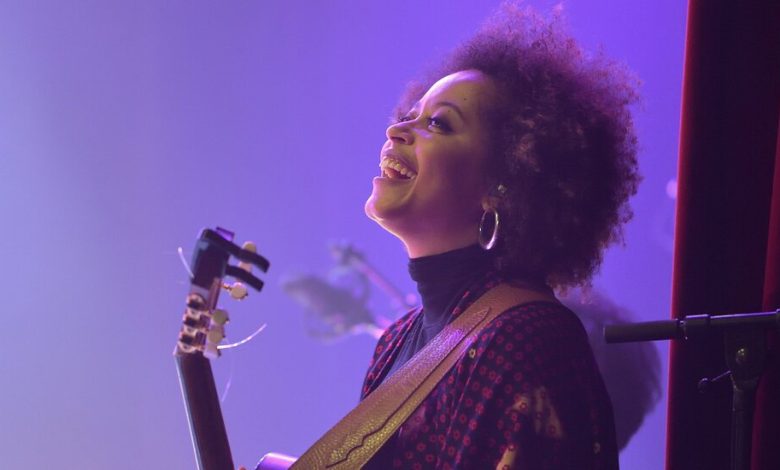Sara Tavares, Portuguese Singer Who Prized Her African Roots, Dies at 45

Sara Tavares, a Portuguese songwriter, singer and guitarist with a gentle voice and an ear for global pop, died on Nov. 19 in Lisbon. She was 45.
Her label, Sony Portugal, announced the death, in a hospital, on social media. She had been diagnosed with a brain tumor in 2009.
Ms. Tavares began her career in the pop mainstream, singing R&B-influenced songs in Portuguese and English. But as she found her own style, she came to embrace her African roots.
Her parents were from Cape Verde, a nation of islands off the coast of Senegal, and Ms. Tavares increasingly drew on rhythms from across the African diaspora: Cape Verdean morna, funaná and coladeira, Brazilian samba and bossa nova, and Angolan semba, as well as funk and salsa.
She often defined rhythmic fusions with her own intricate guitar picking, and she sang in Portuguese, English, Cape Verdean Creole (known as Criolo) and Angolan slang. In “Balancê,” the title song of her 2005 album and one of her biggest hits, she sang in Portuguese about wanting to share “A new dance/A mix of semba with samba, mambo with rumba.”
Sara Alexandra Lima Tavares was born on Feb. 1, 1978, in Lisbon; her parents had moved to Portugal from Cape Verde earlier in the decade. She grew up admiring American singers like Aretha Franklin, Stevie Wonder and Donny Hathaway; learned English; and delved into gospel music.
At 16, she won a nationally televised contest, “Chuva de Estrelas,” singing the Whitney Houston hit “One Moment in Time.” She went on to represent Portugal at the 1994 Eurovision Song Contest.
Her debut EP, “Sara Tavares & Shout,” released in 1996, emulated American pop-R&B and featured a gospel choir called Shout. Her 1999 album, “Mi Ma Bo” (“You and Me”), was produced by the Paris-based Congolese songwriter Lokua Kanza and dipped into an international assortment of styles. It was certified gold in Portugal.
Ms. Tavares fully came into her own with the albums she released in the 2000s, which she produced or co-produced herself: “Balancê” in 2005, “Xinti” (“Feel It”) in 2009 and — after a hiatus following her diagnosis with a brain tumor — “Fitxadu” in 2017, which was nominated for a Latin Grammy Award. (“Fixtadu” is Criolo for the Portuguese “fechado,” which means closed.) Intricate, transparent and seemingly effortless, carried by acoustic guitars and percussion, her songs offered yearning introspection, thoughts about love and socially conscious admonitions.
In an interview promoting the release of “Balancê,” she said: “When I walk around with my friends, it’s a very, very interesting community. We speak Portuguese slang, Angolan slang, some words in Cape Verdean Criolo, and of course some English. In Criolo there are already English and French words. This is because slaves from all over the world had to communicate and didn’t speak the same languages.”
She added: “I want to be a part of a movement like the African Americans were, like the African Brazilians were. Instead of doing the music of their ancestors, they have created this musical identity of their own. And it is now respected. It is considered whole and authentic and genuine. It will be a long time before the people from my generation do not have to choose between being African or European. I think you shouldn’t have to choose.”
Between her own albums, Ms. Tavares collaborated widely, recording with the Angolan electronic group Buraka Som Sistema and the Portuguese rapper and singer Slow J, among others. Her last release, in September, was “Kurtidu,” a single that used electric guitars and programmed beats. Her voice stayed friendly and airborne on every track she sang, sailing above borders.
Information on survivors was not immediately available.
Ms. Tavares received online tributes from the presidents of both Portugal and Cape Verde, where she had won Cabo Verde Music Awards for best female voice in 2011 and for “Fitxadu” in 2018.
President José Maria Neves of Cape Verde said on Facebook:
“Sara Tavares, through her voice, her smile, her glance, was able to plant peace, friendship and brotherhood among Cape Verdeans, and also between Cape Verdeans and the world.” He added, “Your light will illuminate the path that still lies with us, in this land that temporarily welcomes us.”



